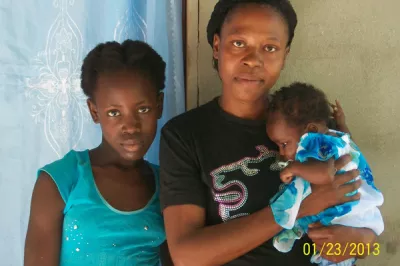Haiti’s Graduation Pilot Final Evaluation,Promising Results
Fonkoze started Chemin Levi Miyo, or Pathway to a Better Life in Haitian Creole, in 2008 to tackle rural Haiti’s extreme poverty in a holistic manner. The program is one of the nine pilots in the CGAP-Ford Foundation Graduation Program, a global effort to understand how safety nets, livelihoods, and microfinance can be sequenced to create pathways for the poorest out of extreme poverty, adapting a methodology developed by BRAC in Bangladesh.
The face of extreme poverty in Haiti is multifaceted, and this reality holds strong for the rural poor in Haiti. Macro-level constraints such as limited access to markets, a dearth of employment opportunities, absence in social safety nets, and virtually no social accountability at the local level contributes to the complexity of Haiti’s deprivation. Fonkoze’s graduation program provides five main areas of support: a cash stipend and provision of productive assets to help build sustainable livelihoods and food security; access to health services and savings to reduce vulnerability, close support of program staff who provide enterprise training, advice, and most important, moral support to help participants build skills, confidence and “agency”; provision of housing renovations, water filters, and school uniforms to improve social conditions; social links with village elites to help build up social networks for the poorest.
Our final evaluation of the program six months after its end shows that poverty levels of members has reduced, and this is directly attributable to increased ownership of livestock (which went up by from 5% to 39%), improved housing conditions, and greater land cultivation. A very promising result is that the percentage of members suffering from food insecurity with hunger has declined by over 50% since the program start. In addition, health seeking behaviour (going to a health clinic in case of illness) has improved for over 40% of members. The number of participants reporting that all or most of their children are regularly attending school increased from 27% to 70%. In depth qualitative interviews also show that most members gained self-confidence, and say they have greater status within the household.
At the pilot stage, the program has demonstrated significant positive impact upon the lives of its members with 97% per cent of the 150 women that participated “graduating” out of the program. Seventy-five percent of them have continued on into TiKredi, a small loan program. In one site, all of the program members who graduated into TiKredi have already successfully moved on into Fonkoze’s larger loan product. However, things aren’t so bright for those who didn’t move into microcredit: we saw a slight decline in indicators for the 25% of participants who did not join TiKredi since our mid-term evaluation. This could well mean that, in the absence of other options, self-employment is the only real exit gate out of poverty in rural Haitian context.
Although the program’s achievements have been remarkable, the challenge of sustaining improvements is stark. When it scales up the programme, Fonkoze will have to address other challenges such as identifying more sustainable livelihoods for participants; for example, the most viable strategy pursued by many program participants in one site is charcoal production in an already heavily deforested land. For those who are not ready to integrate into microcredit, finding alternative graduation pathways poses another challenge. Given the intense vulnerability of the population, there is always a demand for Fonkoze to do and provide more. While most graduation programs rely on the government to deliver health, education and welfare benefits, Fonkoze does not have this luxury. One can only hope that the silver lining amidst the tragic earthquake is an opportunity to re-build Haiti and provide the country’s most vulnerable with basic entitlements.




Comments
Undoubtedly, Haiti’s broken
Undoubtedly, Haiti’s broken economy presents a huge opportunity for MFIs. One option Fonkoze has is to become an intermediary between two micro-enterprises that come together to form a supply chain. For instance, one batch of borrowers can be trained in tree plantation (added benefit: reforestation, possible entry into CDM markets), while the other batch can deal in charcoal production/sale, and the MFI can form the link between the two. This helps create lasting enterprises with relatively secured demand and supply for either party.
Add new comment